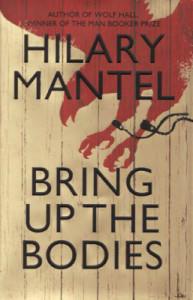There was a moment, a few weeks back, when I was listening to four audio books (not simultaneously, obvs): Bring Up The Bodies by Hilary Mantel, Autumn by Ali Smith, Anything Is Possible by Elizabeth Strout and They Came To Baghdad by Agatha Christie. And I thought to myself, wow, what a line-up. Does it get any better than this?
Alas, Autumn has fallen by the wayside. I love Ali Smith so I don’t think there’s anything wrong with the novel. What I suspect is that her style doesn’t translate well to audio – so few styles do. I love her whimsicality on the page, but it doesn’t come across so well when you’re listening. I must get hold of the book. And the Agatha Christie was a delight, but you probably don’t need me to tell you anything about it. You will either love Agatha or not, as the case may be, but if you love her, it’s a really fun and clever outing on her part.
Which leaves me with two novels to talk about here, one of which I expect lots and lots of people have read, the other of which I expect lots and lots of people are intending to read. And what fine novels they both were.

When the novel begins, Henry is falling in love with Jane Seymour. She’s described as quiet, whey-faced, retiring, prudish, submissive. All the things, in other words, that Anne Boleyn is not – and this is not a coincidence. But Anne is in the early stages of pregnancy and so her position on the throne is relatively safe. Jane Seymour’s brothers and her father are in no doubt about the upswing in their fortunes that Henry’s infatuation might bring them. Jane is primped ready to meet the king’s needs while Anne is with child. But this never happens. Anne loses the child and, already out of love with her, torn by the desire for a male heir and by the desire for Jane, Henry starts to whine. He decides that this abrupt u-turn in his feelings can only be accounted for if Anne actually bewitched him into loving her in the first place.
Honestly, men! It’s bad enough they come up with this nonsense, but to see a long, inevitable chain of events unspooling from this ridiculous notion that will lead to Anne’s death is quite another matter. If ever a reader were in any doubt as to why power should be controlled by law and divided by as many people as possible, this is the book to clarify the reasons.
Ironically enough, Anne’s execution is facilitated by the death of the first queen, Katherine. While Katherine was alive, Henry had a reason to stick to his guns over Anne, out of stubborn contrariness if nothing else. But when she dies, then Henry starts to feel how lovely it would be if he and the Pope were on better terms again. Anne was an interloper, she put Henry in disfavour with the Catholic church, she has caused him problems without producing the required male child. Oh poor Anne; as spiky, egotistic and loveless a character as she is in Mantel’s version (and Mantel is brilliant in her portrayal), the sheer mendacity and corruption of the case that is brought against her is enough for outrage on her behalf.
Oh and lots of other things happen too: Cromwell is gearing up for his assault on the monasteries, an indication, I felt, of the general overreaching that is creeping into his management of the king’s affairs. Henry is often described as a big baby, and Cromwell, in that case, becomes his over-indulgent mother, giving him everything he really ought not to have. But in doing so, in the ever swifter dynamic of tending to the king’s needs with no hesitation and the experience of power it brings, he is starting to lose sight of the integrity he might once have possessed. If this book had been a movie, a sequel to Wolf Hall and a precursor of the final conclusion to Cromwell’s life, it would probably have been a mess of storylines without satisfying resolution. The kind of in-fill number that you are cynically made to watch if you want to follow the entire story. But in Mantel’s hands it’s all kinds of wonderful. Sharp, insightful, dramatic, gripping and exceptionally written. I expect you’ve heard other people say that, too.

It doesn’t really matter if you haven’t read the first novel, because the real beauty of this novel – comprised in a series of interconnecting stories – is how the dots are all joined up between the people who feature within it. There was a moment in every story, a gorgeous AHA! moment, when I realised who it was we were reading about, which of the characters who had made a short appearance or been referred to in an earlier story. As in Lucy Barton, it’s a way in which the structure of gossip is used so cleverly and given such unexpected depth. It’s a gossipy small town situation that we always find ourselves in, and if you feel inclined to find that insignificant in any way, there’s plenty of times when you’ll say: Oh, so that’s what happened to so-and-so! And you’ll realize that gossip is storytelling at its most compelling.
What Elizabeth Strout also does with supreme narrative efficiency is draw us into lives of quiet anguish and the unexpected compensations they contain. Strout’s characters suffer: they have trauma in their past, and poverty, and deep, abiding sadness. But these sorrows are balanced by the genuine rewards that sometimes enter their lives – and Strout knows exactly what a real, honest reward looks like. Patty Nicely, a counselor at the local high school, is bruised by an encounter with an ugly-mouthed teenager, who lets it be known that Patty’s worst secrets are common knowledge. But Patty finds her equilibrium when she summons the strength to understand the young woman and actively help her. How does she find it? Well, in between these two moments, she reads the latest book by Lucy Barton, a warts-and-all memoir of her childhood, and it delivers the grace of insight. ‘The book had understood her’, Strout writes in one of her devastatingly simple sentences. And I wonder how many people feel understood now in their ordinary sadness by Strout’s luminous writing.
There are so many wonderful stories in this narrative that it’s tempting to go on too long about them. My favorite was probably the one about the artist who comes to town for a week’s conference and is lodged with a couple who seem very respectable on the surface. Until the guest goes to bed and the hosts go upstairs to watch her do this on the webcam they have planted in her room. And I did love the story where Lucy briefly returns (as part of her book tour) to Amgash and a reunion with the brother and sister she hasn’t seen in seventeen years. It goes as well and as dreadfully as you might expect.
It’s funny when I think back on Elizabeth Strout’s Pulitzer-prize-winning Olive Kitteridge and remember that I really didn’t like it. It was one of the very few books back at that time in my life that I didn’t finish. I’m not sure which one of us has changed. But I feel that Strout’s writing has more emotional balance to it now, and that it makes all the difference. Boy, does she know how to do anguish! And she can take you to places that are almost too painful to tolerate – such ordinary humiliations, such unspeakable losses. In Anything Is Possible, though, the title holds a clue. People can be so reliably surprising; life can be so unexpectedly, ironically generous. These are the touches of grace that we live for, and which Strout captures so beautifully on the page.
Advertisements